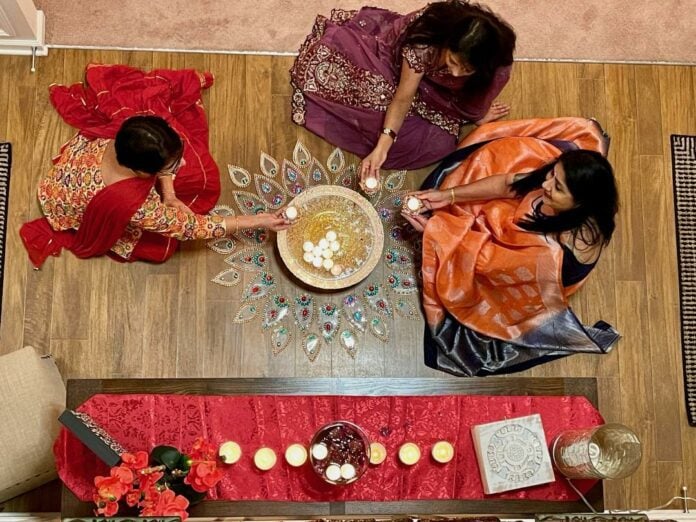
This past week, many families in Indianapolis celebrated the new year with Diwali, the Hindu festival of light.
The five-day religious holiday began Nov. 10 and marks the last day of the calendar year. The main celebration takes place Nov. 12 — the night of the new moon — with the lighting of oil lamps to celebrate a good new year, Rupal Thanawala, president of the Asian American Alliance, told the Recorder.
“We exchange sweets, we exchange gifts and our elders give us gifts or money,” she said. “It’s like the busiest time of the year for us so that’s why we have to cook so much. Because people come all the time to your house, at least, traditionally, that’s how it used to be.”
Diwali not only celebrates the new year but the victory of light over darkness and good over evil, Thanawala said. In Hindu mythology, there was a demon that god killed, which brought victory over evil and ushered in peace and a new beginning.
Approximately 1.2 billion Hindus celebrate Diwali, Thanawala said. It is a public holiday widely recognized in many countries outside of India, including Thailand, Singapore, Malaysia and Indonesia.
“It is almost a combination of our Christmas and Thanksgiving because we are thankful to the God, and that’s why we cook a lot of food, and we donate a lot of food to people because we want to help those who are less fortunate. So, this is the time for us to do service also,” she said.
Shalin Desai, a meditation teacher for the Art of Living workshop, said Diwali was always a big deal growing up in India. Students typically get two weeks off from school for the holiday and families use that time to visit relatives, cook special dishes, exchange gifts and sweets, and feast with one another leading up to Diwali.
Desai said he remembers his mother decorating trays of Mithai sweets for them to give to neighbors and family members, lighting lamps together — since the direct translation of Diwali means “row of lamps or lights” — and setting off fireworks at night to celebrate.
“As I grew up, I realized that these festivals are not just some things that we’re doing,” Desai said. “There’s such beautiful, deep meaning behind all of these things … you share the goodness that you have in your life.”
Grand celebrations are usually held in Hindu temples with thousands of people in attendance dressed up in colorful clothing and jewelry. There will usually be an offering spread for the gods, where hundreds of different food offerings are left, Thanawala said.
Cooking food to help feed those in need is also a large part of Diwali, and many families take part in volunteer days leading up to Diwali, Desai added.
“Two days before Diwali, there’s this festival called Dhanteras where you worship the abundance that you have in life, and not just the wealth that you look at, the bank balance and stuff, but all the things we are grateful for in life,” Desai said.
On the main day of Diwali, families also take part in the Laxmi Puja — or offering service — which honors the goddess of wealth, Thanawala said. This is done with coins and candles so wealth and abundance will come into their homes during the new year.
“We just put flowers on it, and we light a lamp next to it because this is also the celebration when we think that now wealth will come to our house,” Thanawala said. “Because now Diwali means the Goddess of wealth will come to our house — it’s all goodness is going to come next year. That is the meaning of this celebration.”
Thanawala, who also grew up in India, said some of the main differences about celebrating Diwali lie in the community itself. Although Indianapolis has a large and welcoming Asian community, Thanawala said the Hindu community here is smaller than in India, so most celebrations are held in homes or in temples; friends and family come over on the weekend.
However, Thanawala is intentional about carrying on the traditions for her children and exposing them to the festivities, such as decorating the entrance of the home in bright colors to welcome goodness into the home, she said.
“I had to make extra effort and be very intentional about celebrating Diwali … and doing all those traditions at home, which otherwise they would not experience,” Thanawala said.
Despite its small size, the celebrations put on by the Hindu community in Indianapolis are impactful.
“It’s good to be able to celebrate this and especially here in Indianapolis,” Desai said. “We have such a vibrant Indian community here and everyone kind of feels welcome, and it’s great that you’re able to come together and celebrate this together.”
For more information about Diwali, visit aaalliance.org or myiai.us.
Contact staff writer Chloe McGowan at 317-762-7848 or chloegm@indyrecorder.com. Follow her on Twitter @chloe_mcgowanxx.
Chloe McGowan is the Arts & Culture Reporter for the Indianapolis Recorder Newspaper. Originally from Columbus, OH, Chloe graduated with a degree in journalism from The Ohio State University. She is a former IndyStar Pulliam Fellow, and her previous work includes freelancing for Indy Maven, Assistant Arts & Life Editor for The Lantern, and editorial assistant at CityScene Media Group. Chloe enjoys covering all things arts and culture — from local music, visual art, dance, theater and film, as well as minority-owned businesses. In her free time, Chloe enjoys reading, cooking and keeping her plants alive.




